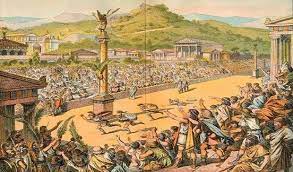Olympics – Yay or nay?
Many are wondering how safe the Olympics can be during a global pandemic.

The Olympic Games are the leading international sporting event in which thousands of athletes from around the world compete in a variety of competitions. The creation of the Olympic Games derived from the ancient Olympic Games held in Olympia, Greece over 3000 years ago. The Games evolved over the centuries to become what we know now as the modern Olympic Games. The Olympics are held every 4 years, alternating between the Summer and Winter Olympics every 2 years in the 4 year period. The top award is the coveted Gold Medal, and most Olympic athletes train for decades to ensure they are in the best possible condition to represent their Country and take home the gold.
This year’s Games are being held in Tokyo, Japan from July 23- August 8, 2021 and will feature Summer sports. The Games were postponed from Summer 2020 due to the Covid-19 pandemic. Japan’s Prime Minister, Shinzo Abe, reached an agreement with the International Olympic Committee (IOC) in March 2020 to postpone the Games instead of canceling, promising a safe environment for thousands of people expected to be in attendance. Approximately, 10,000 athletes had been scheduled to march into Tokyo’s national stadium for the opening ceremony. About 600,000 people from all over the world were expected to travel to Tokyo for the games. Many people from around the world are still wondering if the Games should go on due to ongoing concerns about spreading the coronavirus.
The easily transmittable and highly contagious virus has led to the cancellation or postponement of many major sporting events around the world, such as, the 2020 Ice Hockey Championship and the Horse Racing World Cup. The postponement of the 2020 Olympic Games in Tokyo came after much pressure due to the risks involved with Covid-19. There have been 121 million reported cases worldwide, which include 2.6 million deaths. Many countries publicly stated that they would not be comfortable sending their athletes to Tokyo to compete in the Games. Athletes from all over the world also had performance concerns because they were unable to train due to gyms being shut down and social distancing guidelines. There has been a glimmer of hope and progress with two promising vaccines being rolled out worldwide. However, there is still so much uncertainty due to the lack of knowledge with how the vaccines stack up against the newly discovered Covid-19 virus mutations. New cases of the mutated virus have been showing up world wide, and infecting people who have received their full doses of the vaccine.
Many people are divided on whether or not the Olympics should still occur this year. I decided to reach out to a local journalist, Frank Shatz, for his take on the Games proceeding during a worldwide pandemic. Mr. Shatz has first hand experience on what it is like being on the front lines of the Olympics. He was the founder and organizer of the “Olympic People-for-People Program” during the 1980 Winter Olympics held in Lake Placid, New York. “The Olympics are considered a sporting event of the greatest significance,” stated Mr. Shatz. “Thus, the cancellation of the Games will carry serious consequences.”
Mr. Shatz believes if the Japanese authorities can ensure a safe environment for all involved, then the Tokyo Olympics should be held. The Olympics often produce an unforgettable event. Mr. Shatz recalled such a unique experience. During the 1980 Winter Games, the “Miracle on Ice” hockey event was being played out. The team representing the United States of America, comprised of mostly college age students, was playing the seemingly undefeatable Soviet team, which was made of primarily professional players. America won the event as millions watched from home and in person. “It was a Cold War victory at a time when our nation needed a lift to our spirit,” he recalled. “Who knows what unique result we could miss if the Tokyo Games get cancelled?”



